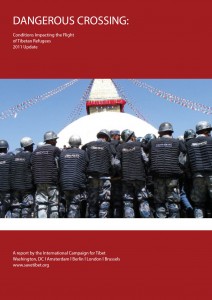 A new report by the International Campaign for Tibet (ICT) examines the increasing dangers for long-staying and transiting Tibetan refugees in Nepal as China seeks to enforce foreign compliance with its own hard line against Tibetans.
A new report by the International Campaign for Tibet (ICT) examines the increasing dangers for long-staying and transiting Tibetan refugees in Nepal as China seeks to enforce foreign compliance with its own hard line against Tibetans.
“Nepal is an historic commercial and cultural gateway for Tibetans and for decades has provided refuge or safe transit for thousands of Tibetans fleeing oppression in Tibet. Now, in order to respect and preserve the bonds between Nepalis and Tibetans, Nepal must resist significant pressure from the Chinese government to comply with its hard line against Tibetans. Many Nepalis would resist what feels unnatural and manipulative, but pressure from China typically comes with economic and other inducements. Given the hardships, political instability and other stresses in Nepal continuing to this day, such inducements are increasingly well-received, rendering Tibetans and their status in Nepal commensurately vulnerable,” says Mary Beth Markey, ICT President.
The new 2011 update of ICT’s annual report, Dangerous Crossing:
Conditions Impacting the Flight of Tibetan Refugees, describes how China seeks to delegitimize the Tibetan community in Nepal, rendering large numbers of Tibetans in Nepal vulnerable to political exploitation, and unable to partake in state services or travel without threat of harassment, extortion or detention. Dangerous Crossing documents the following:
- A correlation exists between China’s post-2008 engagement with Nepal and the suppression of the Tibetan community by Nepali security forces and bureaucracy. China’s aid, support for security forces, high-level political visits, infrastructure development, and trade are openly contingent on Nepal’s demonstrated commitment to preventing so-called ‘anti-China’ activities by Tibetans. Over the same period, Tibetans’ rights to freedom of movement, expression, assembly, cultural life and religion have been significantly curtailed in Nepal.
- Since the protests and crackdown in Tibet beginning in March 2008, the number of Tibetans who have successfully eluded capture and reached the U.N.-funded Tibetan Refugee Transit Center in Kathmandu has decreased, and border security has been intensified dramatically. Nepal is an essential gateway for Tibetans into exile that the Chinese authorities are seeking to block.
- A 2010 intelligence-sharing agreement between Nepal and China has been followed by unprecedented levels of surveillance of the Tibetan community by Nepali and Chinese state agents, and facilitates the arrest and harassment of Tibetans.
- Recent bureaucratic changes in Nepal restricting education, motorbike licenses, and travel in addition to existing restrictions on owning property, registering businesses, and working in the public section, are compounding the impoverishment of the Tibetan community.
A pdf copy of the report can be downloaded online at www.https://savetibet.org from Thursday, October 11.

